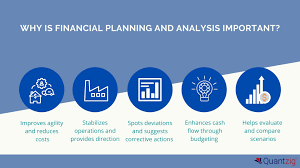
Unlocking Financial Success: Key Insights for Effective Financial Planning
Financial Planning Insights: Navigating the Path to Financial Success
Financial planning is an essential aspect of our lives, yet it often gets overlooked or postponed. However, taking the time to plan and manage your finances can make a significant difference in achieving your long-term goals and securing a stable financial future. In this article, we will explore some key insights into financial planning that can help you navigate the path to financial success.
- Set Clear Goals: The first step in effective financial planning is setting clear and realistic goals. Whether it’s saving for retirement, buying a home, or funding your child’s education, having specific objectives in mind allows you to develop a tailored plan that aligns with your aspirations.
- Create a Budget: A budget serves as the foundation of any successful financial plan. Take the time to analyze your income and expenses, distinguishing between needs and wants. This will help you identify areas where you can cut back on unnecessary spending and allocate more towards savings or investments.
- Build an Emergency Fund: Life is unpredictable, and unexpected expenses can arise at any moment. Establishing an emergency fund that covers three to six months’ worth of living expenses provides a safety net during challenging times, such as job loss or medical emergencies.
- Manage Debt Wisely: Debt can be a significant obstacle on the path to financial success. Prioritize paying off high-interest debts first while making minimum payments on others. Consider consolidating debts or negotiating lower interest rates to accelerate debt repayment.
- Invest for the Future: Investing is an essential component of long-term wealth accumulation. Diversify your investment portfolio based on your risk tolerance and time horizon. Consult with a financial advisor who can guide you in selecting suitable investment options aligned with your goals.
- Protect Yourself with Insurance: Life is full of uncertainties, and having appropriate insurance coverage safeguards you from potential risks. Evaluate your insurance needs for health, life, disability, and property to ensure adequate protection for you and your loved ones.
- Plan for Retirement: It’s never too early to start planning for retirement. Take advantage of retirement savings accounts like 401(k)s or IRAs and contribute regularly. Consider consulting a financial planner to determine the ideal retirement strategy based on your desired lifestyle and expected expenses.
- Review and Adjust Regularly: Financial planning is not a one-time task; it requires ongoing monitoring and adjustments. Regularly review your financial plan, reassess your goals, and make necessary changes to accommodate life events or shifts in priorities.
- Seek Professional Guidance: While managing your finances independently is commendable, seeking professional advice can provide valuable insights and expertise. A certified financial planner can help you develop a comprehensive plan tailored to your unique circumstances.
- Stay Informed: Financial markets, tax laws, and economic conditions are constantly evolving. Stay informed by reading reputable financial publications, attending seminars or webinars, or engaging in discussions with knowledgeable individuals. This knowledge will empower you to make informed decisions regarding your finances.
In conclusion, financial planning is a crucial step towards achieving long-term financial success. By setting clear goals, creating a budget, managing debt wisely, investing strategically, protecting yourself with insurance, planning for retirement, reviewing regularly, seeking professional guidance when needed, and staying informed about financial matters – you can navigate the path to a secure financial future with confidence. Start today; your future self will thank you!
6 Frequently Asked Questions About Financial Planning Insights: Answers to Creating a Financial Plan, Saving Money Strategies, Debt Reduction, Investment Considerations, Wise Money Budgeting, and Tax Implications of Investing
- How can I create a financial plan?
- What are the best strategies for saving money?
- How can I reduce my debt?
- What investments should I consider?
- How do I budget my money wisely?
- What are the tax implications of investing?
How can I create a financial plan?
Creating a financial plan can seem overwhelming, but breaking it down into manageable steps can help you get started. Here’s a guide to help you create your own financial plan:
- Set Clear Goals: Determine your short-term and long-term financial goals. Do you want to save for a down payment on a house, pay off debt, or plan for retirement? Having specific goals will guide your financial planning process.
- Assess Your Current Financial Situation: Take stock of your current financial situation by analyzing your income, expenses, assets, and liabilities. This will give you a clear picture of your financial standing and help identify areas for improvement.
- Create a Budget: Develop a budget that aligns with your goals and reflects your income and expenses. Categorize your expenses into essential (such as housing, utilities, food) and discretionary (entertainment, dining out), and allocate funds accordingly. Ensure that you have room for savings and investments within your budget.
- Build an Emergency Fund: Start setting aside funds for emergencies. Aim to save at least three to six months’ worth of living expenses in an easily accessible account like a savings account or money market fund. This will provide a safety net during unexpected events.
- Manage Debt Wisely: Evaluate your outstanding debts and develop a plan to pay them off strategically. Prioritize high-interest debts first while making minimum payments on others. Consider consolidating debts or negotiating lower interest rates to expedite repayment.
- Invest for the Future: Determine the appropriate investment strategy based on your risk tolerance and time horizon. Research different investment vehicles such as stocks, bonds, mutual funds, or real estate investment trusts (REITs). Consider seeking guidance from a financial advisor who can help you make informed investment decisions.
- Plan for Retirement: Assess how much you will need for retirement based on factors such as desired lifestyle and expected expenses during retirement years. Explore retirement savings options like employer-sponsored plans (such as 401(k)s) or individual retirement accounts (IRAs). Contribute regularly and take advantage of any employer matching programs.
- Review Insurance Coverage: Evaluate your insurance needs for health, life, disability, and property. Ensure that you have adequate coverage to protect yourself and your loved ones from potential risks. Consult with an insurance professional to determine the appropriate coverage levels.
- Regularly Review and Adjust: Financial planning is an ongoing process. Regularly review your financial plan, reassess your goals, and make necessary adjustments based on changes in your life circumstances or financial landscape.
- Seek Professional Guidance: If you feel overwhelmed or unsure about certain aspects of financial planning, consider consulting a certified financial planner (CFP). They can provide personalized advice based on your specific situation and help optimize your financial plan.
Remember, creating a financial plan is a dynamic process that requires regular monitoring and adjustments. Stay informed about personal finance topics through reliable sources, continue learning about investment strategies, tax laws, and economic trends to make informed decisions along the way.
What are the best strategies for saving money?
Saving money is a wise financial habit that can lead to long-term financial stability and help you achieve your goals. Here are some effective strategies for saving money:
- Create a Budget: Establishing a budget is essential for managing your finances effectively. Take the time to track your income and expenses, categorize them, and identify areas where you can cut back on unnecessary spending.
- Set Savings Goals: Setting specific savings goals provides motivation and direction. Whether it’s saving for an emergency fund, a down payment on a house, or a dream vacation, having clear objectives helps you stay focused and committed to saving.
- Automate Savings: Make use of technology by setting up automatic transfers from your checking account to a separate savings account. This way, a portion of your income will be saved without any effort on your part.
- Reduce Unnecessary Expenses: Analyze your spending habits and identify areas where you can cut back. Consider reducing dining out, entertainment expenses, or subscription services that you no longer use frequently.
- Shop Smart: Before making a purchase, compare prices from different retailers or online platforms to ensure you are getting the best deal. Look for discounts, coupons, or sales to save money on everyday purchases.
- Prioritize Debt Repayment: High-interest debt can eat into your savings potential. Focus on paying off debts with the highest interest rates first while making minimum payments on others. Once one debt is paid off, redirect those funds towards the next debt in line.
- Practice Mindful Spending: Before making non-essential purchases, ask yourself if it aligns with your priorities and brings value to your life. Delaying gratification and avoiding impulsive buying decisions can significantly boost your savings.
- Cut Utility Costs: Be mindful of energy consumption by turning off lights when not in use, using energy-efficient appliances, adjusting thermostats appropriately, and insulating your home properly. These small changes can lead to significant savings on utility bills.
- Negotiate Bills and Expenses: Don’t be afraid to negotiate with service providers such as cable, internet, or insurance companies. Often, they are willing to offer discounts or better deals to retain customers.
- Save on Transportation: Consider carpooling, using public transportation, or biking when possible to save on fuel and maintenance costs. If you live in an area with good public transportation, you may even consider downsizing to one vehicle or going car-free.
- Track Progress and Celebrate Milestones: Regularly monitor your savings progress and celebrate milestones along the way. Seeing your savings grow and achieving smaller goals will provide motivation to continue saving.
Remember, saving money is a habit that requires discipline and consistency. By implementing these strategies into your daily life, you can develop a strong financial foundation and work towards achieving your long-term financial goals.
How can I reduce my debt?
Reducing debt can be a challenging but rewarding endeavor. Here are some strategies to help you effectively tackle and reduce your debt:
- Create a Detailed Overview: Start by gathering all your debt information, including balances, interest rates, and minimum monthly payments. This overview will help you understand the full extent of your debt and prioritize your repayment plan.
- Develop a Budget: Establishing a budget is crucial for managing your finances effectively. Analyze your income and expenses to identify areas where you can cut back on spending and allocate more towards debt repayment. Be disciplined with your budget and stick to it.
- Prioritize High-Interest Debts: Focus on paying off high-interest debts first, as they tend to accumulate more interest over time. By prioritizing these debts, you can save money in the long run and accelerate your path to becoming debt-free.
- Consider Debt Consolidation: If you have multiple debts with varying interest rates, consolidating them into a single loan or credit card with a lower interest rate can simplify repayment and potentially save you money. However, carefully weigh the pros and cons before opting for consolidation.
- Negotiate Lower Interest Rates: Contact your creditors and explore the possibility of negotiating lower interest rates on your existing debts. Explain your situation honestly and demonstrate that you are committed to repaying the debt. Lower interest rates can significantly reduce the overall amount you need to repay.
- Make Extra Payments: Whenever possible, make extra payments towards your debts beyond the minimum required amount. This additional payment goes directly towards reducing the principal balance, helping you pay off the debt faster.
- Snowball or Avalanche Method: Two popular approaches to debt repayment are the snowball method and avalanche method. In the snowball method, start by paying off the smallest debt first while making minimum payments on other debts. Once one is paid off, move on to the next smallest debt until all are cleared. The avalanche method involves prioritizing debts with the highest interest rates first, regardless of their balance. Both methods have their merits, so choose the one that aligns with your preferences and financial situation.
- Seek Professional Guidance: If you feel overwhelmed or unsure about how to proceed, consider seeking assistance from a credit counseling agency or financial advisor. They can provide personalized guidance and help you develop a debt repayment plan tailored to your circumstances.
- Avoid Accumulating New Debt: While focusing on reducing existing debt, it’s crucial to avoid accumulating new debt. Practice responsible spending habits and resist the temptation to rely on credit cards or loans for unnecessary purchases.
- Stay Motivated: Reducing debt requires discipline and perseverance. Stay motivated by tracking your progress, celebrating milestones along the way, and visualizing the freedom and financial security that comes with becoming debt-free.
Remember, reducing debt takes time and effort. Be patient with yourself and stay committed to your goals. With consistent effort and smart financial choices, you can successfully reduce your debt burden and achieve greater financial freedom.
What investments should I consider?
When considering investments, it’s important to keep in mind your financial goals, risk tolerance, and time horizon. Here are a few investment options you may consider:
- Stocks: Investing in individual stocks allows you to become a partial owner of a company. Stocks offer the potential for long-term growth and can provide dividends as well. However, they also come with higher risk due to market fluctuations.
- Bonds: Bonds are debt securities issued by governments or corporations. They offer fixed interest payments over a specified period, making them more stable than stocks. Bonds can be suitable for conservative investors seeking steady income.
- Mutual Funds: Mutual funds pool money from multiple investors to invest in a diversified portfolio of stocks, bonds, or other assets. They are managed by professionals and provide instant diversification without requiring significant capital.
- Exchange-Traded Funds (ETFs): ETFs are similar to mutual funds but trade on stock exchanges like individual stocks. They offer diversification and lower expense ratios compared to some mutual funds.
- Real Estate Investment Trusts (REITs): REITs allow investors to own shares in real estate properties or mortgages without direct ownership responsibilities. They provide an opportunity for income generation through rental payments or property appreciation.
- Index Funds: Index funds replicate the performance of a specific market index, such as the S&P 500, by holding all or a representative sample of the index’s securities. They offer low costs and broad market exposure.
- Commodities: Investing in commodities like gold, silver, oil, or agricultural products can serve as a hedge against inflation or market volatility. However, commodity prices can be influenced by various factors beyond your control.
- Certificates of Deposit (CDs): CDs are time deposits offered by banks with fixed interest rates and maturity dates ranging from a few months to several years. They provide stability and predictable returns but may have lower yields compared to other investments.
- Peer-to-Peer Lending: Peer-to-peer lending platforms allow individuals to lend money directly to borrowers, bypassing traditional financial institutions. It can provide an opportunity for higher returns but carries the risk of borrower defaults.
- Retirement Accounts: Contributing to retirement accounts like 401(k)s or IRAs can offer tax advantages and long-term growth potential. These accounts typically offer a range of investment options tailored to retirement savings.
Remember, it’s essential to conduct thorough research, diversify your portfolio, and consider consulting with a financial advisor who can provide personalized guidance based on your specific financial situation and goals.
How do I budget my money wisely?
Budgeting your money wisely is a fundamental aspect of financial planning. It helps you track your income and expenses, prioritize your spending, and ensure that you are saving and investing for the future. Here are some steps to help you budget your money wisely:
- Track Your Income and Expenses: Start by understanding your financial inflows and outflows. Keep track of all sources of income, including salary, freelance work, or side hustles. Similarly, record all your expenses, from fixed costs like rent or mortgage payments to variable expenses like groceries, transportation, entertainment, and debt repayments.
- Categorize Your Expenses: Categorize your expenses into different categories such as housing, transportation, utilities, groceries, entertainment, debt repayment, savings/investments, and miscellaneous items. This will help you see where your money is going and identify areas where you can potentially cut back.
- Differentiate Between Needs and Wants: Differentiating between essential needs and discretionary wants is crucial in budgeting wisely. Focus on covering necessary expenses first before allocating money towards discretionary items or non-essential purchases.
- Set Financial Goals: Determine your short-term and long-term financial goals. Whether it’s building an emergency fund, paying off debts faster or saving for a down payment on a house – having clear objectives will guide your budgeting decisions.
- Create a Realistic Budget: Based on your income and expenses analysis, create a realistic budget that aligns with your financial goals. Allocate funds to each expense category while ensuring that you have enough left for savings or investments.
- Prioritize Saving/Investing: Make saving a priority in your budget by allocating a portion of your income towards savings or investments early in the budgeting process rather than treating it as an afterthought. Automate savings if possible to ensure consistency.
- Reduce Unnecessary Expenses: Review each expense category critically to identify areas where you can cut back. Look for opportunities to reduce discretionary spending or find more cost-effective alternatives without compromising your quality of life.
- Track Your Progress: Regularly monitor your budget and track your progress towards your financial goals. Use budgeting apps or spreadsheets to help you stay organized and easily visualize your financial situation.
- Adjust When Necessary: Life is dynamic, and your budget should be flexible enough to accommodate changes. Adjust your budget as needed when facing unexpected expenses, income fluctuations, or changes in financial priorities.
- Seek Professional Advice: If you find it challenging to create or stick to a budget, consider seeking guidance from a financial advisor or planner who can provide personalized advice based on your unique circumstances.
Remember, budgeting is an ongoing process that requires discipline and commitment. Stay consistent with tracking expenses, revisiting your budget regularly, and making adjustments when necessary. By budgeting wisely, you can take control of your finances and work towards achieving your financial goals.
What are the tax implications of investing?
Investing can have various tax implications that investors need to be aware of. Here are some key tax considerations when it comes to investing:
- Capital Gains Tax: When you sell an investment, such as stocks, bonds, or real estate, any profit you make is considered a capital gain. Capital gains can be classified as either short-term or long-term, depending on the holding period of the investment. Short-term capital gains are taxed at your ordinary income tax rate, while long-term capital gains are subject to lower tax rates if held for more than one year.
- Dividend Income: If you receive dividends from stocks or mutual funds, they may be subject to taxation. Qualified dividends are generally taxed at the same preferential rates as long-term capital gains. However, non-qualified dividends are typically taxed at your ordinary income tax rate.
- Interest Income: Interest earned from investments such as bonds or savings accounts is generally taxable as ordinary income in the year it is received.
- Required Minimum Distributions (RMDs): Once you reach a certain age (currently 72 for most retirement accounts), you are required to start taking minimum distributions from certain retirement accounts like Traditional IRAs and 401(k)s. These distributions are generally subject to income tax.
- Tax-Advantaged Accounts: Investing through tax-advantaged accounts like Individual Retirement Accounts (IRAs) or employer-sponsored 401(k)s can provide potential tax benefits. Contributions made to these accounts may be deductible or made with pre-tax dollars, reducing your taxable income in the year of contribution.
- Tax Loss Harvesting: When you sell an investment at a loss, you can use those losses to offset capital gains and potentially reduce your overall taxable income for the year.
- Estate Taxes: In some cases, investments held at the time of death may be subject to estate taxes if their total value exceeds certain thresholds set by the government. Estate tax rules can be complex and may vary depending on the jurisdiction.
It’s important to note that tax laws and regulations can change, so it’s advisable to consult with a qualified tax professional or financial advisor who can provide personalized guidance based on your specific situation. They can help you understand the tax implications of your investments and develop strategies to optimize your tax position while staying compliant with applicable laws.



